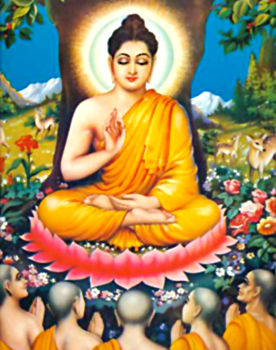 The last postulate of Nistha in the Dhammapada is the concept of the Brahmana. Lord Buddha did not believe in the caste system. According to him, Brahmana is he who is without sin. He had said, "One who does not commit any sin or offend anyone by his body, speech or mind, who is restrained in these three things, - him I call a Brahmana". He emphasised on the fact that one who is bestowed with Truth, Dhamma and righteousness is indeed the Brahmana. He is the blessed soul. Similarly the other essential qualities which an individual needed to cultivate in order to become the Brahmana were to give away all cravings, being tranquil, subdued, controlled, and chaste and not injuring others.
The last postulate of Nistha in the Dhammapada is the concept of the Brahmana. Lord Buddha did not believe in the caste system. According to him, Brahmana is he who is without sin. He had said, "One who does not commit any sin or offend anyone by his body, speech or mind, who is restrained in these three things, - him I call a Brahmana". He emphasised on the fact that one who is bestowed with Truth, Dhamma and righteousness is indeed the Brahmana. He is the blessed soul. Similarly the other essential qualities which an individual needed to cultivate in order to become the Brahmana were to give away all cravings, being tranquil, subdued, controlled, and chaste and not injuring others.
The Brahmana is the highest ideal in the mind of Lord Buddha. Attainment of Brahmana is a very high level of mental development. The Lord had said that one who is without sin, who forgives his offender, who does not offend anyone, who is pure, who is without possession, who is without attachment and who has left even the craving for his existence is indeed the Brahmana. The Lord wanted that everyone should make his best effort to reach this pure state, which automatically brings Nirvana.
Dhammapada says that the Brahmana is one who has ceased all cravings and passions and is drenched with the views of eternalism and nihilism. When the mind resists to violence, there occurs cessation of all suffering.
An individual who silently endures all insults and is endowed with the qualities of tolerance and patience he is worthy to be called a Brahmana. The other qualities that had been ascribed to the Brahmana by Lord Buddha were one should perform his religious duties, should be pure and virtuous, should be controlled, should guide others in the right direction and should not offend others then only can an individual rise to the state of Brahmana. A person should also be tolerant, unattached, righteous and meditative in order to become a Brahmana. The state of Brahmana is not decided by the apparel or wealth of an individual on the contrary it depends on the inner qualities of an individual.
It has also been said in the Dhammapada that one who has reached the deathless state that is the Nirvana is also called a Brahmana. Lord Buddha had preached his disciples that one, who is doubtless, has no desires either for this world or the next world raises to the stature of Brahmana. An individual should become fearless, should awaken himself, should become stainless pure, serene, undisturbed, should give up all sensual desires and should come out from all kinds of hypocrisies in order to become the Brahmana.
Lord Buddha had opined that a Brahmana should strive and cut off the stream of desire, should drive away the sense of desires and should know the destruction of life`s constituents in order to know the uncreated or the Nirvana. A man whose wisdom is profound, who discerns the right and the wrong, who is able to conquer the world with his knowledge, one who knows fully the death and birth of living, who lives aright and who is the Buddha or the enlightened is called the Brahmana.
Ultimately the concept of Brahmana ends saying that one whose way is unknown to Devas (gods), Gandharvas (heavenly minstrels) and to men, who has destroyed all defilements, who is an Arhant-venerable such a man is called a Brahmana.
The true Brahmana according to the Buddhist Philosophy knows his former abodes, realises heaven and hell, reaches the end of his births, makes himself perfect along with his superior and accomplishes all that he is supposed to accomplish.




















